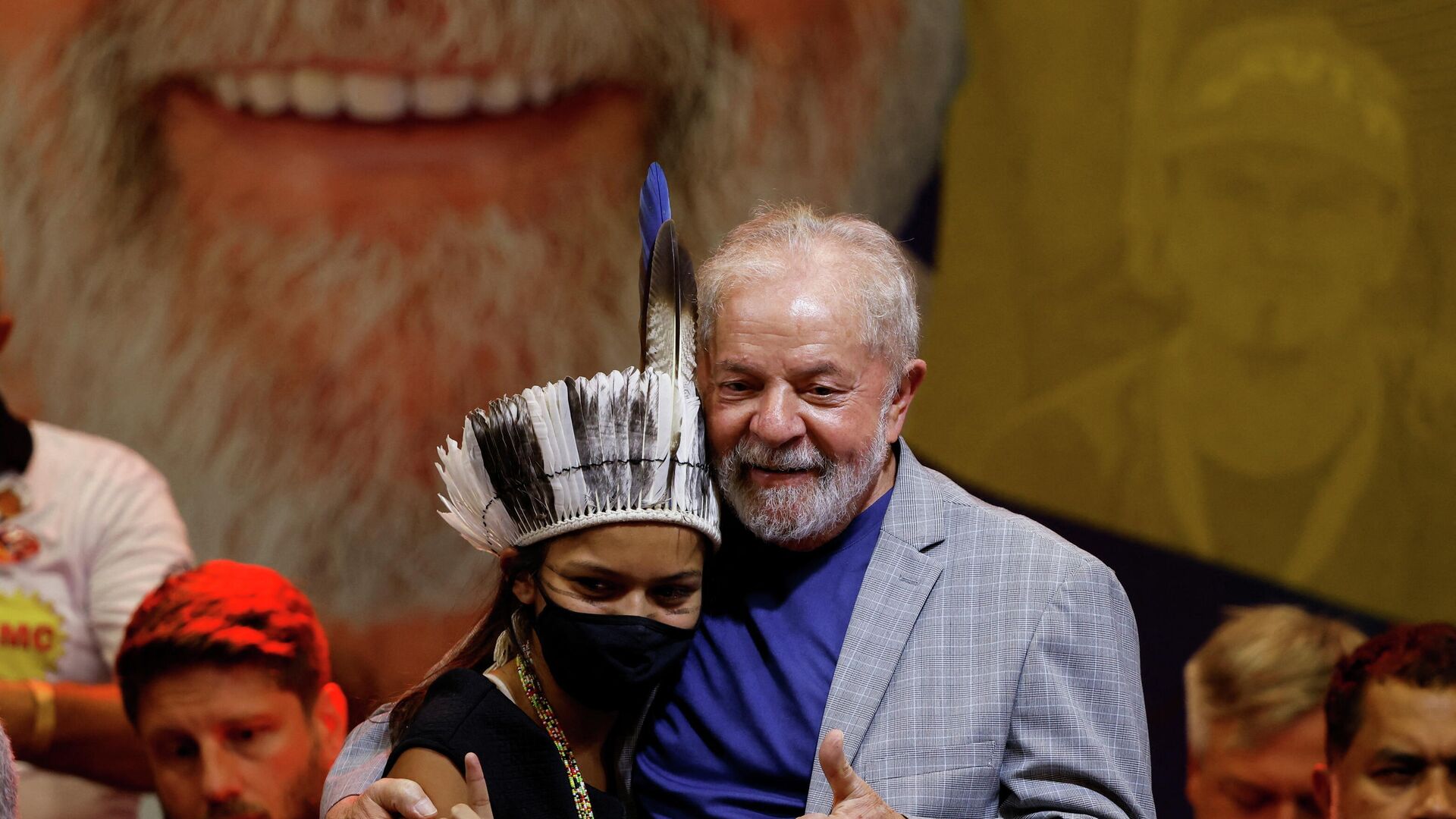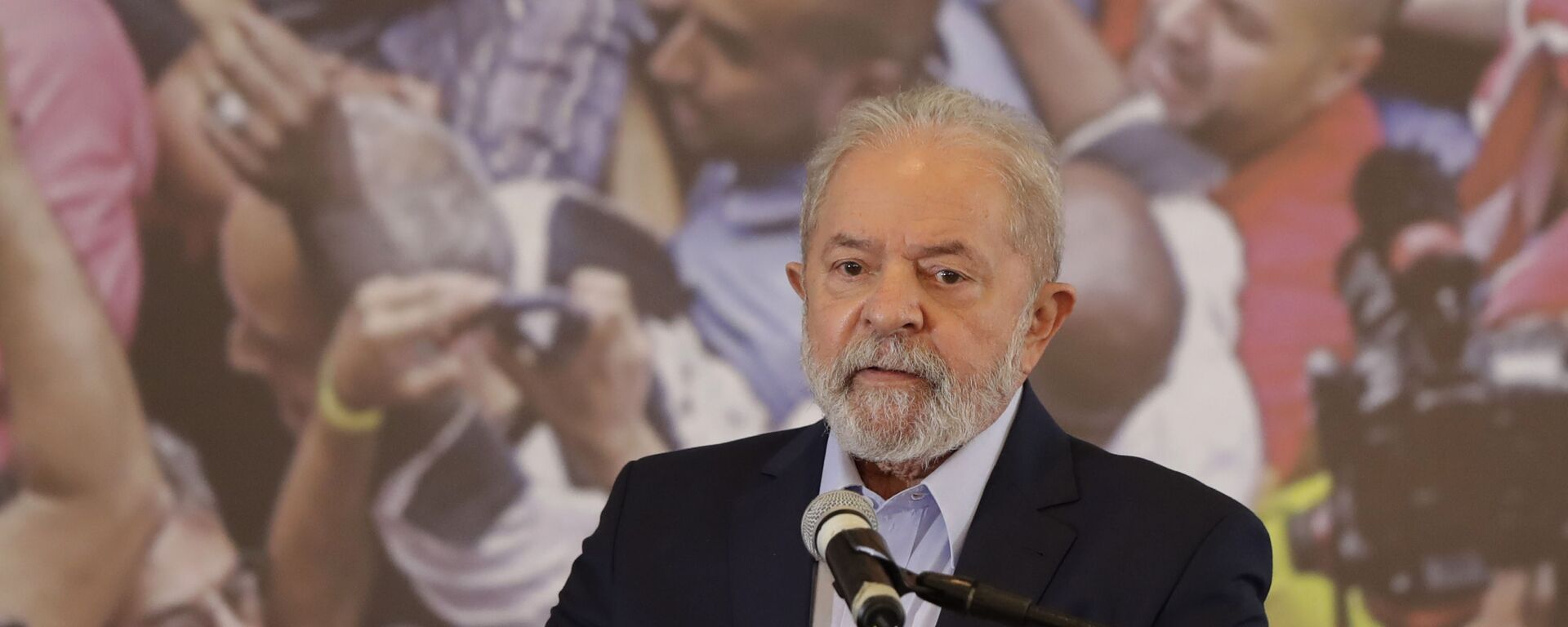https://sputnikglobe.com/20220321/brazilian-ex-president-lula-holds-14-point-poll-lead-over-bolsonaro-1094064417.html
Brazilian Ex-President Lula Holds 14-Point Poll Lead Over Bolsonaro
Brazilian Ex-President Lula Holds 14-Point Poll Lead Over Bolsonaro
Sputnik International
During Lula's two terms as president, from 2003 to 2010, Brazil was one of the most prominent of the 'Pink Tide' of left-wing Latin American governments... 21.03.2022, Sputnik International
2022-03-21T22:07+0000
2022-03-21T22:07+0000
2024-03-11T10:57+0000
jair bolsonaro
brazil
dilma rousseff
lula da silva
election
https://cdn1.img.sputnikglobe.com/img/07e6/03/15/1094064456_0:0:3125:1759_1920x0_80_0_0_3c40538cdd102fa6bc86e7748258b6a3.jpg
Brazilian Worker's Party leader Luis Inácio Lula da Silva has taken a 14-point poll lead over incumbent President Jair Bolsonaro in the run-up to the October general election.The left-wing former president has 43 percent support to Bolsonaro's 29 percent, according to pollsters FSB Pesquisa. If that lead is translated to real votes, Lula would win in the first round of voting for president on October 2.In a two-horse run-off between the incumbent and Lula —as would happen on October 30 if no clear winner emerges in the first round, the left-winger would lead by an overwhelming 19 percent.A huge 59 percent of voters surveyed said they would never vote for Bolsonaro, the Liberal Party candidate and former army captain first elected in 2018. The poll was commissioned by investment bank BTG Pactual.Lula, a former steelworker union leader, served as president for two terms, between 2003 and 2010. His government was marked by funding for social programmes to reduce poverty in the country of over 200 million people, and was one of the most prominent, if not radical, members of the so-called 'Pink Tide' of left-wing Latin American governments in the 2000s.His government stuck to agreements with the International Monetary Fund, paying off loans two years early in 2005. Brazil helped found the BRICS economic cooperation alliance with other leading emerging economies in 2006.Under Lula's leadership, Brazil became one of the most prominent, if not radical, members of the so-called 'Pink Tide' of left-wing Latin American governments in the 2000s.His party-mate and successor Dilma Rousseff was impeached by the country's Congress in a 2016 'legislative coup' led by her coalition government partner Michel Temer. The accusation against Rousseff was that her government borrowed to increase public spending in the year before the 2014 election.Temer's interim government was beset by corruption scandal surrounding multiple conflict of interest scenarios between lawmakers and national oil firm Petrobras and South American construction giant Odebrecht.Lula was tried for corruption and jailed in January 2018. Following revelations of a conspiracy between the judge in the trial and a leading prosecutor to convict the leader to prevent him from again holding office, Lula was released in November 2019 and his convictions later overturned.Bolsonaro has faced widespread protests in middle-class neighbourhoods over his attitude to the COVID-19 pandemic, which he dismissed as a "sniffle".
https://sputnikglobe.com/20210415/brazilian-supreme-court-upholds-earlier-decision-to-overturn-sentence-for-former-president-lula-1082642718.html
brazil
Sputnik International
feedback@sputniknews.com
+74956456601
MIA „Rossiya Segodnya“
2022
James Tweedie
https://cdn1.img.sputnikglobe.com/img/07e4/08/1c/1080307270_0:3:397:400_100x100_80_0_0_7777393b9b18802f2e3c5eaa9cbcc612.png
James Tweedie
https://cdn1.img.sputnikglobe.com/img/07e4/08/1c/1080307270_0:3:397:400_100x100_80_0_0_7777393b9b18802f2e3c5eaa9cbcc612.png
News
en_EN
Sputnik International
feedback@sputniknews.com
+74956456601
MIA „Rossiya Segodnya“
Sputnik International
feedback@sputniknews.com
+74956456601
MIA „Rossiya Segodnya“
James Tweedie
https://cdn1.img.sputnikglobe.com/img/07e4/08/1c/1080307270_0:3:397:400_100x100_80_0_0_7777393b9b18802f2e3c5eaa9cbcc612.png
jair bolsonaro, brazil, dilma rousseff, lula da silva, election
jair bolsonaro, brazil, dilma rousseff, lula da silva, election
Brazilian Ex-President Lula Holds 14-Point Poll Lead Over Bolsonaro
22:07 GMT 21.03.2022 (Updated: 10:57 GMT 11.03.2024) During Lula's two terms as president, from 2003 to 2010, Brazil was one of the most prominent of the 'Pink Tide' of left-wing Latin American governments, including Venezuela, Bolivia and Ecuador, joining revolutionary Cuba in opposing the US corporate hegemony in the region.
Brazilian Worker's Party leader Luis Inácio Lula da Silva has taken a 14-point poll lead over incumbent President Jair Bolsonaro in the run-up to the October general election.
The left-wing former president has 43 percent support to Bolsonaro's 29 percent, according to pollsters FSB Pesquisa.
If that lead is translated to real votes, Lula would win in the first round of voting for president on October 2.
In a two-horse run-off between the incumbent and Lula —as would happen on October 30 if no clear winner emerges in the first round, the left-winger would lead by an overwhelming 19 percent.
A huge 59 percent of voters surveyed said they would never vote for
Bolsonaro, the Liberal Party candidate and former army captain first elected in 2018. The poll was commissioned by investment bank BTG Pactual.
"I don't believe in polls, but the guy who practically destroyed Brazil is ahead," Bolsonaro said in a radio interview. "Either the surveys are fraudulent or people are not well informed."
Lula, a former steelworker union leader, served as president for two terms, between 2003 and 2010. His government was marked by funding for social programmes to reduce poverty in the country of over 200 million people, and was one of the most prominent, if not radical, members of the so-called '
Pink Tide' of left-wing Latin American governments in the 2000s.
His government stuck to agreements with the International Monetary Fund, paying off loans two years early in 2005. Brazil helped found the BRICS economic cooperation alliance with other leading emerging economies in 2006.
Under Lula's leadership, Brazil became one of the most prominent, if not radical, members of the so-called '
Pink Tide' of left-wing Latin American governments in the 2000s.
His party-mate and successor Dilma Rousseff was impeached by the country's Congress in a 2016 'legislative coup' led by her coalition government partner Michel Temer. The accusation against Rousseff was that her government borrowed to increase public spending in the year before the 2014 election.
Temer's interim government was beset by corruption scandal surrounding multiple conflict of interest scenarios between lawmakers and national oil firm Petrobras and South American construction giant Odebrecht.
Lula was tried for corruption and jailed in January 2018. Following revelations of a conspiracy between the judge in the trial and a leading prosecutor to convict the leader to prevent him from again holding office, Lula was released in November 2019 and his convictions later
overturned.
Bolsonaro has faced widespread protests in middle-class neighbourhoods over his attitude to the COVID-19 pandemic, which he dismissed as a "sniffle".



